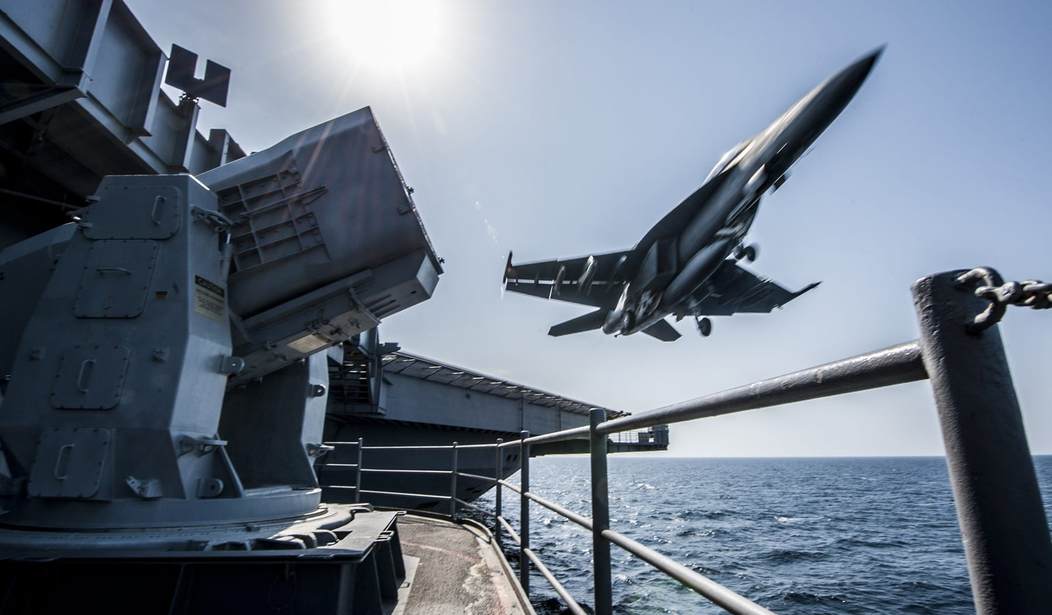The spokesman for Operation Inherent Resolve said coalition airstrikes targeted ISIS’ oil tankers for the first time — with a warning from the sky first.
Briefing via teleconference from Baghdad to the Pentagon this morning, Col. Steve Warren told reporters that since Saturday “France has conducted numerous strikes against targets in Raqqa” — the capital of the Islamic State.
“Those targets include ISIL headquarters, training camps and storage depots. The French have been a robust partner and a robust member of Operation Inherent Resolve. They were the first — they were our first NATO partner to strike Iraq in September of ’14 and they’ve conducted about 12 percent of all of the non-U.S. strikes in Iraq and Syria so far. There are approximately 240 French troops here in Iraq training, advising and assisting the ISF,” Warren said.
French President Francois Hollande’s order to deploy the aircraft carrier Charles de Gaulle to the region “will, we believe, add significant strike capability to the coalition.”
The coalition has been conducting Operation Tidal Wave II in the Syrian Euphrates River Valley.
“In Al-Bukamal, we destroyed 116 tanker trucks, which we believe will reduce ISIL’s ability to transport its stolen oil products,” Warren said. “This is our first strike against tanker trucks, and to minimize risks to civilians, we conducted a leaflet drop prior to the strike. We did a show of force, by — we had aircraft essentially buzz the trucks at low altitude.”
The leaflets, which fluttered to the ground about 45 minutes before the strikes, simply said: “Get out of your trucks now, and run away from them. Warning: airstrikes are coming. Oil trucks will be destroyed. Get away from your oil trucks immediately. Do not risk your life.”
“We combine these leaflet drops with very low altitude passes of some of our attack aviation, which sends a very powerful message,” the colonel added.
He said the decision to drop warnings came after they “assessed that these trucks, while although they are being used for operations that support ISIL, the truck drivers, themselves, probably not members of ISIL; they’re probably just civilians.”
“So we had to figure out a way around that. We’re not in this business to kill civilians, we’re in this business to stop ISIL — to defeat ISIL.”
Thus, they tried to come up with a strategy “to kind of shoo people away without harming them.”
“So we had to go through that whole process of one, determining whether or not we felt it was in our best interest to strike these trucks. And then once we determined that, yes, it is in our interest to strike these trucks, how do we go about ensuring that we’re able to mitigate the potential of civilian casualties? And these things take time,” Warren said. “…We know the oil funds more than 50 percent of ISIL’s operations. This is something we want to take away from them. That we want — that we need to take this away from them so that they’re — so they’re operations are more difficult to conduct.”
Detailing other aspects of operations, including the Peshmerga coalition seizure of Sinjar, Warren stressed the “overarching objective, which is to partner with indigenous ground forces, enable those indigenous ground forces to conduct offensive operations and then provide coalition air power on top of those offensive operations.”
“As indigenous friendly forces maneuver against our enemy, it causes our enemy to move. The enemy has to react, and as soon as the enemy reacts, we kill them from the air.”
He added that it’s a “rolling process to identify targets, vet those targets, ensure that those targets meet all of our standards for the reduction of civilian casualties and mitigation of the potential of civilian casualties and collateral damage.”
The Russians have not been using precision weapons in their strikes — “dumb bombs,” Warren noted.
“Their history has been both reckless and irresponsible,” he said. “…We’re not coordinating with the Russians, we’re not conducting operations with the Russians, nor are we planning to do any of those things here at the ground level.”









Join the conversation as a VIP Member